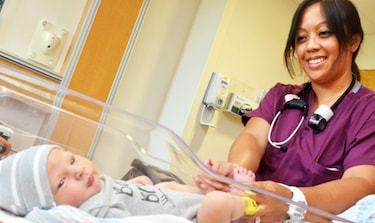 Nurses are the underappreciated, unsung heroes for the work they do in our society. They fill many different selfless and thoughtful roles that keep communities and families healthy. They are educators of families, preventing and treating illnesses and they are the bridge-builders of relationships with patients that lead to compassionate and competent care.
Nurses are the underappreciated, unsung heroes for the work they do in our society. They fill many different selfless and thoughtful roles that keep communities and families healthy. They are educators of families, preventing and treating illnesses and they are the bridge-builders of relationships with patients that lead to compassionate and competent care.
As the importance of nursing professions gains recognition, and more attention is raised around healthcare reform, the nursing field is expected to grow rapidly in the coming years. With a master’s degree, many nurses may take their career to the next level: opening themselves up to more job opportunities and the ability to specialize their career to suit their interests and lifestyle. RN to MSN programs make it convenient for professionals who are ready to advance their career, skills, knowledge, and education and simultaneously want to save time and money.
THE CAREER PATH
The common denominator between all nurses is their passion for helping the community. Beyond that, the path to becoming a nurse can vary greatly between different professionals. You may be a young professional looking to start your career off on a strong note. Or you could be a working parent and you want to set yourself up for better opportunities without compromising your already busy schedule. Regardless, here are options to build your nursing career around your lifestyle and goals.
No matter where or how a career gets started, once a nurse is licensed by the National Council of State Boards of Nursing (NCSBN) through the National Council Licensure Examination (NCLEX-RN), they can easily advance their career forward.
RN to MSN programs offer a way for nurses to go beyond a licensure to practice specialized skills in their career. Nurses with an MSN can gain the skills and knowledge necessary to work in a variety of settings:
- Hands on in situations with staff, patients, or programs
- Administrative roles, leading nursing teams and departments
- Providing high quality, advanced practice patient care
- Educating future generations of nurses
The United States Department of Labor (DOL) outlines some of the options for nurses with an MSN to fill roles such as:
- Community services managers – Work with communities and organizations to plan, coordinate, and implement social service and health programs
- Healthcare or nursing administrators – Work with a team or direct a staff to improve quality of the services provided in a certain department or facility and to ensure compliance with all healthcare regulations and laws
- Nurse educators – Work in educational settings at the secondary or collegiate level to share their knowledge and skills with future generations of nurses
Qualified nurses can also choose to specialize in a specific patient demographic such as pediatrics or gerontology, or they can specialize in certain medical practices that allow them to become a nurse anesthetist, midwife, or practitioner.
As the need for effective healthcare workers in every facet of our society continues to grow, the demand for nurses is also expected to soar over the next few years. The DOL anticipates job demand for nurses to grow by 16% in the coming years.
Getting an MSN may pay off for nurses. The career is rewarding in many ways beyond finances, but the DOL also lists positions with an MSN typically making anywhere from $50,000 to $100,000 annually.
WHO IS THE IDEAL CANDIDATE?
Nursing careers can be born out of many different backgrounds. It is most important for professionals who wish to succeed as nurses to be compassionate and driven to advance patient services alongside of their own career. No matter which specialty they pursue, nurses must be ready to communicate with a wide range of individuals in diverse settings. Nurses with an MSN must be prepared for job duties that include:
- Educating patients and coworkers on the treatment and prevention of conditions
- Observing, assessing, diagnosing, and treating patient conditions
- Overseeing patient records and other sensitive data
- Staying knowledgeable and researching contemporary nursing science
WHAT SHOULD I LOOK FOR?
The foundation of nursing knowledge will be built during the basic education obtained throughout a nursing diploma or associate’s degree and when a nurse retrieves their RN. For nurses that would like to advance their career and take their education one step further to a master’s degree, RN to MSN programs allow licensed nurses to more quickly earn both a BSN and MSN in one continuous program, saving both time and money.
The best programs will be recognized by an accrediting board such as the American Association of Colleges of Nursing. Accredited programs are standardized to cover the most important information for nursing students, to guarantee a quality education.
Accredited RN to MSN programs will usually bridge the subjects that would be covered in both a BSN and MSN curriculum. The topics covered may include core topics and specialty courses such as:
- Health Policy & Ethics
- Advanced Practice Nursing
- Advanced Nursing in Women’s Health
- Cardiology
- Critical-Care
- Addiction Nursing
- Veterans’ Health Care
When it comes to specialized roles in the nursing profession, advanced certification examinations are usually required to validate a professional’s skills. When choosing online RN to MSN programs, aspiring nurses will have the opportunity to customize their chosen programs to take courses that prepare them for potential exams.
COST
Our rankings reveal that cost of an online MSN program ranges from $30,000 to $60,000, so nurses should take their time choosing a program that guarantees the best deal for their goals. Pick an online program with the classes that you want to take and with clinical opportunities that will adequately prepare you for the career path ahead.
